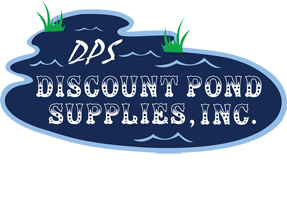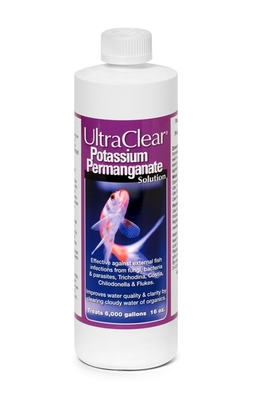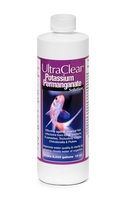ABI Potassium Permanganate Solution is effective against external fish infections from fungi, bacteria & parasites, Trichodinia, Costia, Chilodonella & Flukes. It is also an effective solution for improving water quality & clarity by clearing cloudy water of organics. The Potassium Permanganate Solution is a strong oxidizer. One bottle (16 oz) treats a 6000 gallon pond. It is formulated for 2 ppm based on using a 16 ounce bottle in 6000 gallons.
Read label before using.
Bottle contains Potassium Permanganate Solution.
For Directions/Dosage instructions click the Specs Tab 
Additional General Information:
**The following is simply an overview. There is much literature on the subject of potassium permanganate application that can be readily found on the internet. For more detailed information, such as specific dosages for specific applications, it is recommended that such literature is consulted.
Potassium Permanganate, KMnO4, is a caustic alkali that dissociates into the permanganate ion (MnO4-) and Manganese Dioxide (MnO2). Elemental Oxygen is also liberated in the dissociation. It is very reactive and will readily react with organic material. Potassium Permanganate is a powerful oxidizer. The permanganate ion kills parasites by destroying their cell walls through oxidation. Although, since it is so corrosive to organic tissue, potassium permanganate will expend its oxidative energy on available organic (algae, detritus, dissolved organic compounds, ect) material first rather than parasites or bacteria. Levels of particulate organic matter vary pond to pond.
The parasites that Potassium Permanganate is effective against include protozoan parasites Trichodina, Costia, and Chilodonella. It also treats flukes Gyrodactylus, and Dactylogyrus. Potassium Permanganate can also be used in the treatment of bacterial gill disease and bacterial skin ulcers in fish. Although, it should be noted that repeated treatment can lead to cumulative gill damage. Harmful/lethal doses are only slightly higher than therapeutic doses of potassium permanganate, so dosages must be carefully followed when treating fish with this chemical or fish could die. Toxicity increases as pH increases. Overdosing will cause coagulative necrosis. The tips of the fishís fins will turn white. It should be known that Potassium Permanganate has been shown to kill nitrifying bacteria.
Potassium Permanganate also clarifies water by oxidizing the organic material (nitrogenous waste) of the system. This reduces a systemís biological oxygen demand. Upon treatment, water will turn a shade of pink. The pink should fade to a brown after anywhere from 10-24 hours. This indicates that the Potassium Permanganate has exhausted its oxidative effect, and treatment is done. Once the water has turned amber/brown, it is safe to plants. To revert the color back to clear, hydrogen peroxide must be added in proportionate amounts. Specific information on how much hydrogen peroxide to add can be found readily on the internet. Treatment with potassium permanganate is then not possible for several days after addition of hydrogen peroxide. This is important. It should also be noted that addition of hydrogen peroxide to an aqueous system will increase the systemís dissolved oxygen levels. If your water is an opaque brown at the conclusion of a Potassium Permanganate treatment, decolorize at once with hydrogen peroxide- it should not be opaque. If you try to overdose with Potassium Permanganate to beat a previous dayís hydrogen peroxide, it will not work and fish could be killed.
Potassium Permanganate is a serious caustic irritant in dry form. It is corrosive to tissue such as eyes, due to its caustic nature. Wear gloves when handling potassium permanganate or a potassium permanganate solution. It will readily stain skin brown and may cause irritation. Do not mix Potassium Permanganate with formalin; toxic formaldehyde will be formed. If applied in proper dosages, water undergoing Potassium Permanganate treatment is not toxic to dogs or other pets.
Potassium Permanganate is also effective in the detoxification of applied toxins. When a pesticide (such as rotenone) is applied to a body of water Potassium Permanganate can be added to break down the leftover chemical rather than wait out the effective period of the compound. This can save days, as the applied toxins would generally take a while to flush out.
Directions: Treat before noon. Increase circulation & aeration. Mix well in gallon pail of water. Disperse evenly around pond with extra water agitation. Use protective gloves.
Water Clarity Dose (2 ppm):
Dose @ 2 ppm Pot. Perm. Solution
Use 1 oz. per 375 gallons pond water
Use 8 oz. per 3000 gallons pond water
Use half strength for maintenance.
Parasite & Bacterial Dose (4 ppm):
Use double the above dose @ 4 ppm Potassium Permanganate Solution.
Repeat treatment every 3-4 days if needed
for parasites.
Water should hold pink hue for at least 6 hours. Repeat dose if pink color disappears within 45 minutes. Repeat with half dose (1 ppm) if pink color disappears after 1-2 hours. By-Pass Bio Filter when using 3-4 ppm dose.
Caution: STOP active treatment immediately if fish show signs of extreme discomfort such as jumping or gasping for air. Product should be neutralized (see below) if it remains active for 8 hours. DO NOT OVERDOSE!
How to neutralize: Use 3% Hydrogen Peroxide to immediately neutralize (deactivate). Dose: 2 tbsp per 100 gallons (1 cup per 500 gal). Wait 4 days after neutralizing before treating again with Potassium Permanganate Solution. Do not use with any other treatments including water conditioners, dechlorinators, formalin, formaldehyde & medications.
General: Safe for most plants except hyacinths. Use one teaspoon per 5 gallons water for up to one hour for plant dip. Product may be harmful to snails. May stain porous materials.
Not for use on fish intended for human consumption.
Safe for most live plants and ornamental pond fish. Research specific plant before using Potassium Permanganate Solution.
Warning: KEEP OUT OF REACH OF CHILDREN.
Use required eye protection. Do not ingest. Flush with water for skin or eye contact. Seek medical treatment if ingested or severe irritation with skin. Product heavily stains.


 Now Available
Now Available
